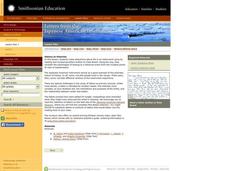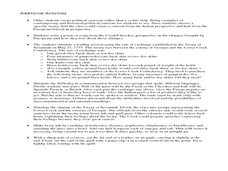Curated OER
Past Imperfect: Examining Secondary Sources of the American Revolution
Ninth graders respond in essay form to the following writing prompt. Mel Gibson, star of The Patriot, is quoted as stating, "If one were to adhere to historical accuracy all the way, you'd probably have the most boring two hours on...
Jamestown-Yorktown Foundation
How Did Relations between Britain and the Colonies Change after the French and Indian War?
What does the French and Indian War have to do with the American Revolution? Following the war, Britain issued the Proclamation of 1763 in an attempt to limit the colonists' western expansion. To understand how the proclamation, the...
Curated OER
AIH-16: Effect of Revolutionary War on American Indians
Young scholars examine how American Indian cultures changed as a result of the Revolutionary War.
Curated OER
Was There an Industrial Revolution? Americans at Work Before the Civil War
High schoolers investigate the First U.S. Industrial Revolution. They identify positive and negative effects of early industrialization, read first-hand accounts, role-play and interview individuals, and participate in a debate.
Curated OER
The DIY: A Hands-On Look at the New Industrial Revolution
Upper graders explore the new industrial revolution and how the tech boom in recent years is similar and different to the Industrial Revolution of the past. They watch a video, explore web sites, and discuss what they see. They work...
Curated OER
Differing Expectations
Students examine the expectations that colonists had for lives prior to the revolution. In this colonial America lesson, students read primary documents that feature the perceptions of white men and minorities during the time period....
Syracuse University
American Industrial Revolution
While the Industrial Revolution may have fueled America's rise to the top of world markets, the child laborers often faced dangerous conditions. Using primary source images and other information, scholars consider what these children...
Curated OER
The Emerging American Identity
Students define what it meant to be an American early on in the nation's history. In this American identity lesson, students examine the noted quotations and determine what was meant by each of the authors with regards to an American...
Curated OER
"What is an American?"
Eleventh graders ponder about what it means to be an "American." They discuss the impact of an author's word choice and sentence structure on text. They identify some major themes and development of the Letters... Compose paragraphs and...
Curated OER
Was There an Industial Revolution? Americans at Work Before the Civil War
Learners tabulate the First Industrial Revolution where a significant number of inventions and innovations appeared transforming American life. Cite examples of change (ex. telegraph) in the lives of Americans during the era of question....
National Endowment for the Humanities
Lesson 3: Religion and the Fight for American Independence
Pupils explore the role religion played in the American Revolutionary War. Using primary documents and writing exercises, students understand how religion was used in support of the war efforts and how specific religious groups responded...
Curated OER
Across The Centuries
Students analyze the American Bill of Rights, compare it to the English Bill of Rights and note the differences in an essay. They access websites imbedded in this plan to do their research, then present their findings to the class.
Curated OER
Letters from the Japanese American Internment
Students examine letters of Japanese-American children during internment in World War II. They discover what it was like in the camps and how they were treated once they were released. They also view photographs of the camps.
Curated OER
Industrialization of the American Landscape - Language Arts
Students examine poetry , editorials, and other writings during the Industrial Revolution. They perform a "chalk talk" to explain perceptions, ideas and observations of the working world. Students write poetry and essays modeled after...
Curated OER
Case Studies of American Innovation
Studnets discover how the Industrial Revolution came to be in the United States. In this technological advancements lesson, students research creations by Henry Ford, the Wright Brothers, and Thomas Edison. Students create PowerPoint...
Curated OER
Enemy or Ally: America's Response to the Russian Revolution
Students examine the events related to the Russian Revolution. In groups, they use the internet to discover the concerns of Woodrow Wilson during this time period and relate them to the origins of the Cold War. To end the instructional...
Curated OER
Corridos About the Mexican Revolution
Students explore the meaning behind Mexican corridos. In this Mexican Revolution lesson, students discover details about the war and its leaders as they read, analyze, and write their own corridos.
Constitutional Rights Foundation
History of Immigration Through the 1850s
Everyone living in the United States today is a descendant from an immigrant—even Native Americans. Learn about the tumultuous history of American immigration with a reading passage that discusses the ancient migration over the Bering...
National Endowment for the Humanities
Lesson 2: The United States, France, and the Problem of Neutrality, 1796–1801
While the French Revolution could be considered inspired by the American Revolution, it created thorny problems for the new United States. Should the United States get involved and be drawn into a European drama? Was the US strong...
Curated OER
First Nations vs. Euro-Americans
Students analyze primary and secondary source documents to help them describe the cooperation and conflict that existed among the American Indians and new settlers. Then, students analyze the purpose, challenges, and economic incentives...
National Endowment for the Humanities
Revolution '67, Lesson 1: Protest: Why and How
To some people, protesting is as American as apple pie, but the factors that lead to protests can be as confusing to veteran activists as to today's youth. Revolution '67 explores the riots in Newark, New Jersey as a case study. Using...
Curated OER
The War in the South, 1778-1781
Students explore the major terms of the Franco-American alliance and their importance to the cause of independence. The most important military engagements in the South are discussed and their significance for the outcome of the war noted.
Curated OER
Native Lands: Indians in Georgia-Shifting Ground Political Cartoon-Introduction
Young scholars explore the relationship between the Creek, Cherokee, and European/American cultures prior to the American Revolution. Students do Internet research to identify and explain changes in these cultures, then create six...
National Endowment for the Humanities
The War in the South, 1778–1781
The second in a three-part look at the Revolutionary War focuses the years from 1778 through 1781 and zooms in on military operations in the southern colonies, the French alliance, and the role African-Americans played in events. Class...
Other popular searches
- American Revolutionary War
- American Revolution Causes
- American Revolution Projects
- The American Revolution
- American Revolution Battles
- Mind Map American Revolution
- Road to American Revolution
- American Revolution Women
- American Revolutionary Figures
- American Revolution Music
- Causes of American Revolution
- Latin American Revolutions

























